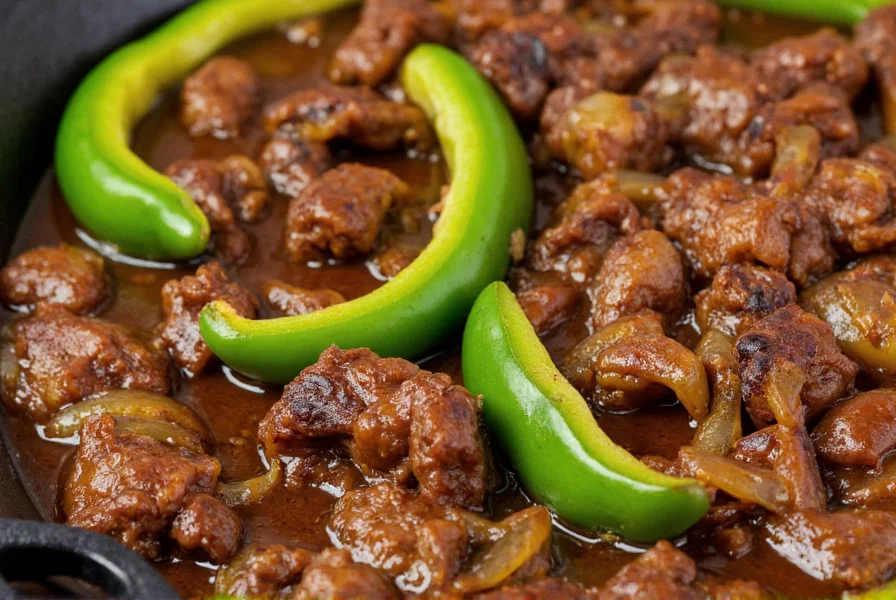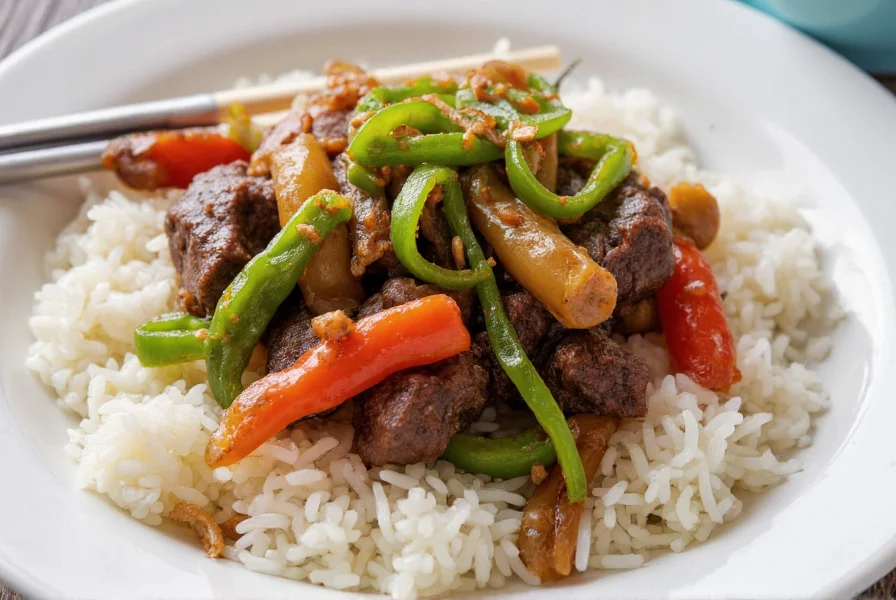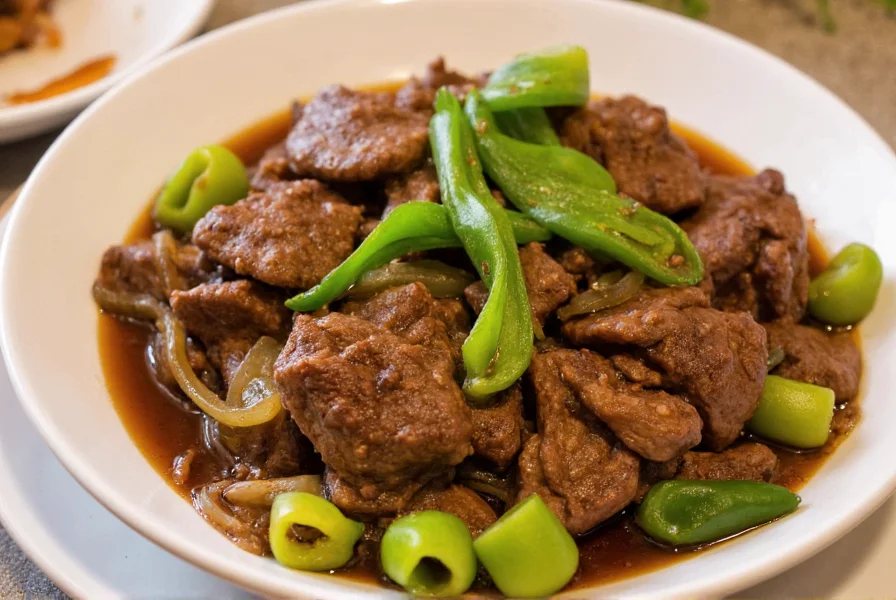Creating the perfect pepper steak with green peppers and onions requires understanding both the technique and ingredient balance that makes this dish stand out from ordinary stir-fries. This beloved American-Chinese classic has become a staple in restaurants and home kitchens alike, but achieving that authentic restaurant-quality result demands attention to specific details that many recipes overlook.
The Essential Components of Authentic Pepper Steak
What separates a mediocre pepper steak from an exceptional one lies in three critical elements: meat selection, vegetable preparation, and sauce composition. The best cut of meat for pepper steak with green peppers and onions is flank steak, though sirloin works well as a more accessible alternative. Proper slicing against the grain into thin, uniform strips (about ¼ inch thick) ensures maximum tenderness—a technique often missed in amateur preparations.

Mastering the Marination Process
The secret to tender pepper steak begins with a proper marinade. Combine 1 pound of sliced steak with 1 tablespoon soy sauce, 1 teaspoon cornstarch, 1 teaspoon rice wine or dry sherry, and ½ teaspoon sesame oil. Let this mixture rest for 15-20 minutes (never longer than 30 minutes for flank steak, which can become mushy). The cornstarch creates a protective coating that seals in juices during the high-heat cooking process essential for restaurant-style pepper steak preparation.
Vegetable Selection and Preparation
For the classic pepper steak with green peppers and onions, select firm, dark green bell peppers and sweet yellow or red onions. Cut peppers into 2-inch strips and onions into similar-sized wedges. The key to maintaining texture is cooking these vegetables separately from the meat—a professional technique that prevents steaming and ensures proper caramelization. Many home cooks make the mistake of overcrowding the pan, which lowers the temperature and results in soggy vegetables rather than the crisp-tender texture characteristic of authentic Chinese pepper steak.
| Ingredient | Proper Preparation | Common Mistake |
|---|---|---|
| Flank Steak | Sliced ¼" thick against the grain | Slicing with the grain causing toughness |
| Green Bell Peppers | 2" strips, cooked separately from meat | Overcooking until soft and limp |
| Onions | 1" wedges, caramelized properly | Adding too early causing mushiness |
| Sauce | Proper cornstarch slurry for gloss | Too thick or too thin consistency |
The Perfect Sauce Formula
The signature brown sauce that defines classic pepper steak recipe with bell peppers balances咸 (xián, salty), 甜 (tián, sweet), and 鲜 (xiān, umami) elements. Combine 3 tablespoons low-sodium soy sauce, 2 tablespoons oyster sauce, 1 tablespoon rice vinegar, 1 tablespoon brown sugar, 1 teaspoon sesame oil, and ½ cup beef broth. Thicken with a cornstarch slurry (1 tablespoon cornstarch mixed with 2 tablespoons cold water) added at the end of cooking. This precise ratio creates that characteristic glossy coating without being gloppy—a common issue in many quick pepper steak dinner attempts.
Step-by-Step Cooking Technique
Follow this professional method for restaurant-quality pepper steak at home:
- Heat 2 tablespoons vegetable oil in a wok or heavy skillet over high heat until smoking
- Quickly sear marinated steak in a single layer (work in batches to avoid crowding)
- Remove steak after 1-2 minutes when browned but still rare inside
- Add 1 tablespoon oil, then stir-fry peppers and onions for 2-3 minutes until crisp-tender
- Return steak to pan, pour in sauce, and toss until glossy (about 30 seconds)
This sequence ensures properly cooked meat without overcooking the vegetables—a critical distinction in authentic Chinese pepper steak preparation that many home cooks miss when attempting to make tender pepper steak with onions.
Avoiding Common Pitfalls
Three frequent mistakes undermine the quality of pepper steak with green peppers and onions:
- Over-marinating the meat – Flank steak becomes mushy beyond 30 minutes in acidic marinades
- Insufficient pan heat – Results in steamed rather than seared ingredients
- Adding sauce too early – Causes the cornstarch to break down before proper thickening
For those seeking a healthier pepper steak recipe with green peppers, consider using reduced-sodium soy sauce and increasing the vegetable-to-meat ratio while maintaining the essential cooking techniques that define this dish.
Serving and Pairing Recommendations
Pepper steak with green peppers and onions pairs perfectly with steamed jasmine rice or noodles. For an authentic experience, serve immediately after cooking while the vegetables maintain their vibrant color and crisp texture. Leftovers (if any) reheat well in a hot skillet but lose some of their initial crispness—a reminder why this dish is best enjoyed fresh, making it an ideal choice for a quick pepper steak dinner when properly timed.

Variations and Adaptations
While the classic American-Chinese version uses green bell peppers, regional variations exist:
- Szechuan style – Adds dried chilies and Szechuan peppercorns for numbing heat
- Hong Kong style – Incorporates black bean sauce for deeper umami
- Vegetarian alternative – Uses seitan or mushrooms as meat substitute
For those with dietary restrictions, a gluten-free pepper steak adaptation works well by substituting tamari for soy sauce and ensuring oyster sauce is GF-certified (or using mushroom sauce as alternative).
Storage and Reheating Guidelines
Store leftovers in an airtight container in the refrigerator for up to 3 days. When reheating pepper steak with green peppers and onions, avoid the microwave which makes vegetables soggy. Instead, use a hot skillet with a splash of water or broth to revive the dish, covering briefly to steam the vegetables back to near-original texture before uncovering to restore some crispness.
Frequently Asked Questions
What's the best cut of meat for pepper steak with green peppers and onions?
Flank steak is ideal for pepper steak with green peppers and onions due to its flavor and texture when properly sliced against the grain. Sirloin works as a more tender but less flavorful alternative. Avoid tougher cuts like chuck that don't respond well to quick stir-frying techniques.
Why does my homemade pepper steak turn out tough?
Tough pepper steak usually results from slicing with the grain rather than against it, overcooking the meat, or using insufficient marinade. Flank steak must be sliced perpendicular to the muscle fibers into thin strips (¼ inch) and cooked quickly over high heat to medium-rare for optimal tenderness in your pepper steak with green peppers and onions.
How can I prevent my vegetables from becoming soggy in pepper steak?
To maintain crisp-tender vegetables in your pepper steak with green peppers and onions, cook them separately from the meat in a very hot pan without overcrowding. Cut vegetables uniformly, use high heat, and stir-fry for just 2-3 minutes. Overcrowding the pan lowers the temperature, causing vegetables to steam rather than sear, which is the primary reason for soggy pepper steak preparations.
What gives pepper steak its characteristic glossy sauce?
The glossy sauce in authentic pepper steak with green peppers and onions comes from a properly executed cornstarch slurry (1 tablespoon cornstarch mixed with 2 tablespoons cold liquid) added at the very end of cooking. The sauce ingredients—soy sauce, oyster sauce, rice vinegar, and broth—must be brought to a boil after adding the slurry, creating that signature restaurant-quality sheen without becoming gloppy.
Can I make pepper steak with green peppers and onions ahead of time?
While pepper steak with green peppers and onions is best served immediately, you can prepare components ahead. Marinate the meat up to 30 minutes in advance, and cut vegetables earlier in the day (store separately in airtight containers). However, complete cooking should happen just before serving, as the dish loses its characteristic crisp-tender texture when stored and reheated, which is why it's ideal for quick dinner preparation rather than meal prep.











 浙公网安备
33010002000092号
浙公网安备
33010002000092号 浙B2-20120091-4
浙B2-20120091-4